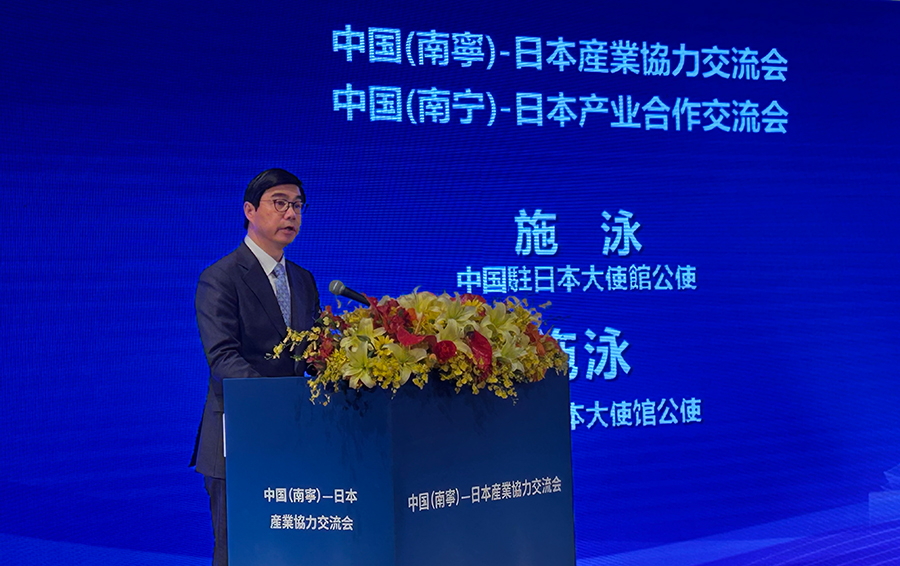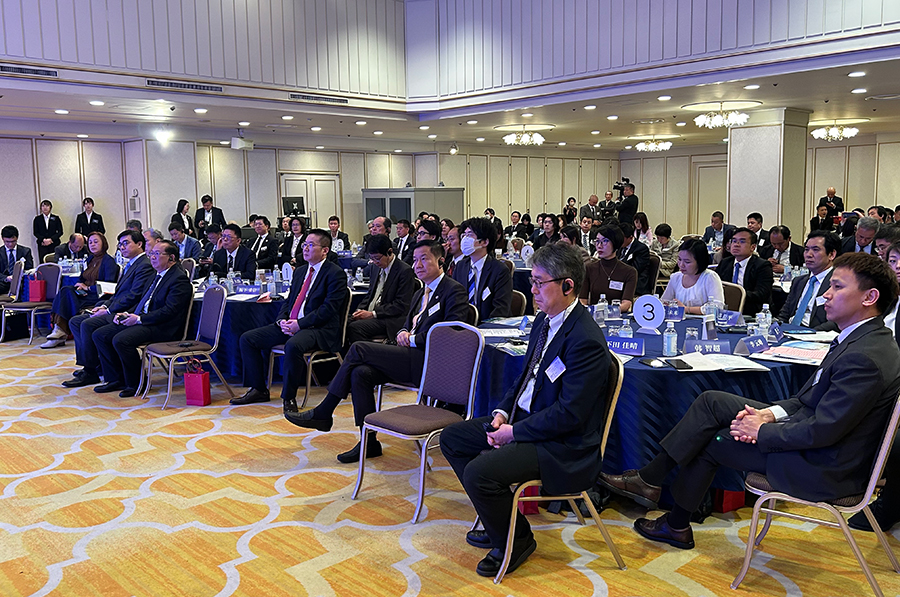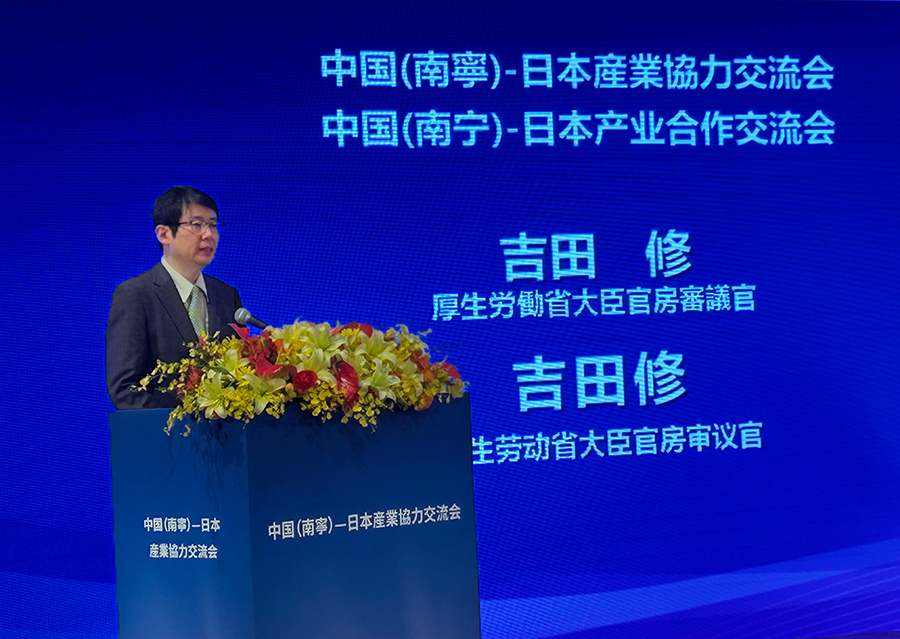
Shi Yong, minister of the Chinese embassy in Japan, delivers a speech at the China (Nanning)-Japan Investment Promotion and Economic Cooperation Exchange Conference in Tokyo on March 27. [Photo by Jiang Xueqing/chinadaily.com.cn]
A Chinese delegation of government and business representatives visited Japan from Wednesday to Saturday to promote in-depth cooperation between Nanning, capital of the Guangxi Zhuang autonomous region, and Japan in elderly care, healthcare, and the broader health industry, aiming to enhance the well-being of both populations.
The delegation attended the China (Nanning)-Japan Investment Promotion and Economic Cooperation Exchange Conference on Thursday, where they highlighted Nanning's investment environment and opportunities in the elderly care industry, health sector, trade and logistics, and chemical materials.
Representatives from Japan's Ministry of Health, Labour and Welfare, Ministry of Economy, Trade and Industry, and the Japan-China Friendship Association delivered speeches at the conference. About 100 participants from the Chinese embassy in Japan, businesses, chambers of commerce, and industry associations from both countries joined the event.
During their visit to Japan, the delegation conducted field studies at companies and entities such as Zenkoukai, Asahi Intecc, and Mitsubishi Chemical Group. They also signed Memorandums of Understanding with Zenkoukai, an operator of elderly-care facilities, and Asahi Intecc, a medical device manufacturer.

About 100 participants from the Chinese embassy in Japan, businesses, chambers of commerce and industry associations from both countries attend the China (Nanning)-Japan Investment Promotion and Economic Cooperation Exchange Conference in Tokyo on March 27. [Photo by Jiang Xueqing/chinadaily.com.cn]
In the future, Nanning plans to deepen cooperation with Japan in healthcare, elderly care, and smart elderly services, building a broader platform for business investment and ensuring that economic cooperation benefits people in both countries.
A Chinese government official said the primary goal of the delegation's visit to Japan was to promote industrial cooperation between Nanning and Japan, learn from Japan's elderly care services, and advance collaboration in artificial intelligence.
The official noted that globalization is facing challenges and uncertainties worldwide, while the Association of Southeast Asian Nations has emerged as one of the most stable and fastest-growing regions.
Located in South China, Nanning serves as a gateway and hub for China-ASEAN cooperation. As a crucial node in the Belt and Road Initiative, Nanning is the closest provincial capital in China to ASEAN countries. It is also the permanent host city of the China-ASEAN Expo, facilitating trade, economic cooperation, and dialogue between China and ASEAN nations.
The Chinese official suggested that Japanese enterprises relocating their business to Nanning could simultaneously access both the Chinese and ASEAN markets.
He emphasized that China-Japan collaboration could play a crucial role in integrating artificial intelligence into various industries, particularly in elderly care. He expressed hopes that AI could enhance elderly care services, ensuring that people of all ages receive proper care while reducing the labor intensity required for elderly care.
On March 22, Chinese Foreign Minister Wang Yi and Japanese Foreign Minister Takeshi Iwaya co-chaired the sixth China-Japan High-Level Economic Dialogue in Tokyo, reaching 20 key consensus points, including strengthening practical cooperation in the fields of elderly services and nursing care and promoting regional economic and trade cooperation.
During the conference on Thursday, Shi Yong, minister of the Chinese embassy in Japan, stated that in the current context of rising unilateral protectionism and headwinds against economic globalization, China and Japan should establish a correct mutual understanding and jointly promote development through innovative thinking. He emphasized the need for both countries to inject new momentum into the global economy and provide stability in an uncertain world.
Shi also noted that China's accelerating economic growth will create new opportunities for enterprises worldwide, including those in Japan. Regardless of changes in the external environment, China remains committed to opening up to the world.
He expressed his hope that Nanning and Japan would explore new cooperative frameworks in technological innovation, green development, digital economy, healthcare, and third-party market collaboration, working together to achieve complementary advantages and mutual benefits at a higher level.
Shigenobu Sakashita, executive director of the Japan-China Friendship Association, said Nanning serves as a gateway to Southeast Asia and plays a significant role in regional development within China.
"The city has made significant progress in areas such as new energy vehicles and biopharmaceuticals. Additionally, as the host city of the China-ASEAN Expo, Nanning enjoys a geographical advantage and has great potential for cooperation with Japan in smart city planning, aging society policies, and environmental initiatives," he said.
Sakashita emphasized that both people-to-people exchanges and economic interactions are the foundation of China-Japan friendship, requiring tangible efforts from both sides. He encouraged deeper discussions on China-Japan relations and meaningful contributions to their development.

Osamu Yoshida, councillor for the minister in Japan's Ministry of Health, Labour and Welfare, delivers a speech at the China (Nanning)-Japan Investment Promotion and Economic Cooperation Exchange Conference in Tokyo on March 27. [Photo by Jiang Xueqing/chinadaily.com.cn]
During last week's China-Japan High-Level Economic Dialogue, the two countries reaffirmed their commitment to strengthen cooperation in nursing care for the elderly. Against this backdrop, Osamu Yoshida, councillor for the minister in Japan's Ministry of Health, Labour and Welfare, stated that the ministry and China's Ministry of Civil Affairs would develop more specific and detailed cooperation plans. He also noted that collaboration in the elderly care sector would expand.
Yoshida explained that Japan's long-term care insurance system has facilitated the gradual expansion of elderly care facilities, involving local governments, institutions, and private enterprises. Through collective efforts, the availability of elderly care facilities and resources in the market has increased, enhancing the overall quality of services.
In the face of a declining young labor force, Japan is integrating robotics and IT solutions into elderly care to improve efficiency and service quality. Yoshida said he hopes that the Nanning delegation's visit would allow them to study exemplary Japanese companies and entities and gain insights into Japan's latest advancements in elderly care technology.
Takashi Miyamoto, a director at Zenkoukai, said many Japanese companies are continuously improving efficiency and productivity in elderly care services. However, Zenkoukai's approach goes beyond simply implementing robotics or information technology solutions — it focuses on a comprehensive system for elderly care.
Miyamoto said in Nanning, Zenkoukai would need to improve overall elderly care facilities and service quality through comprehensive talent development. He emphasized that while Zenkoukai follows a Japanese-style approach, the company will respect local culture and traditions when operating in China, ensuring that elderly care services in Nanning are tailored to the city's unique characteristics.